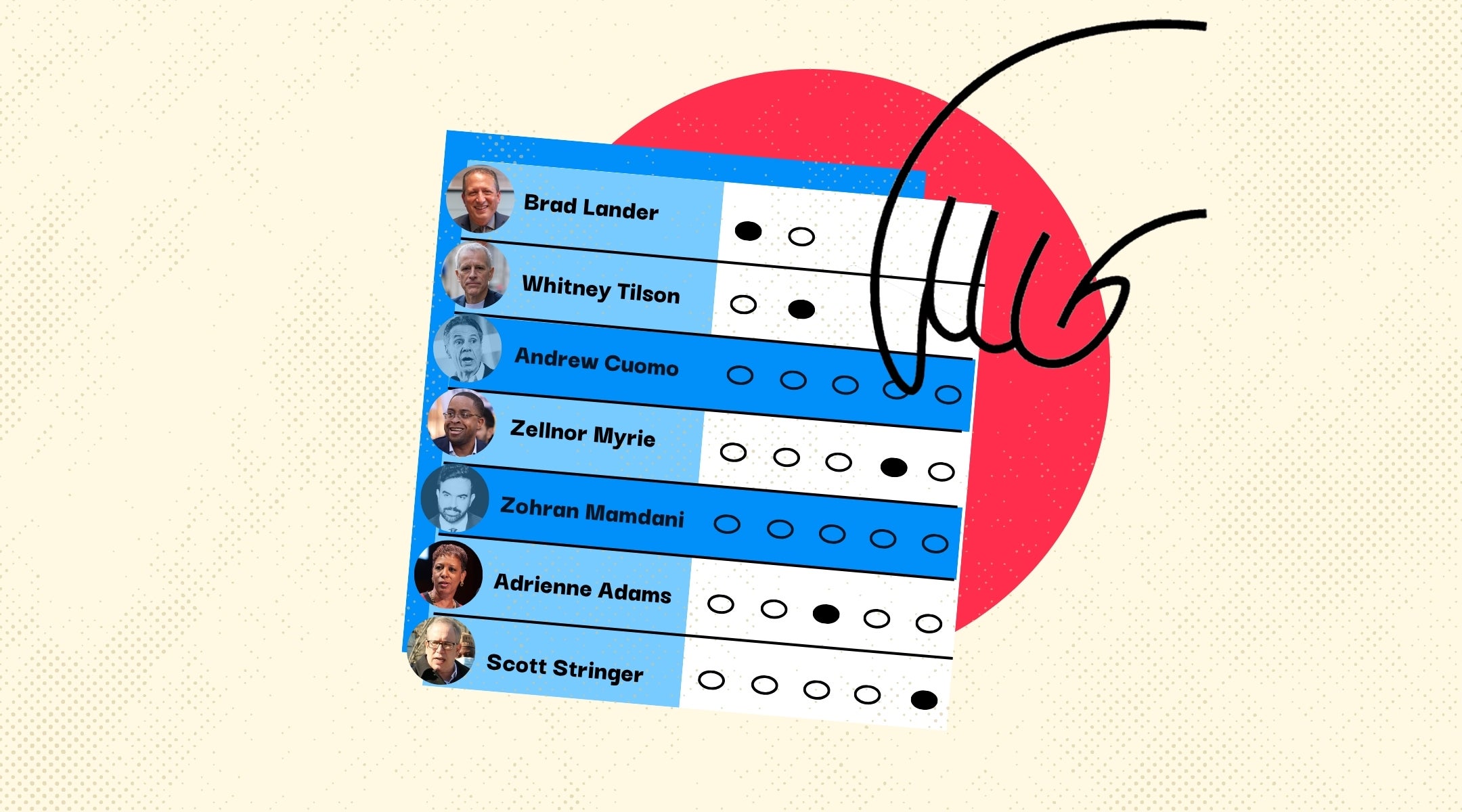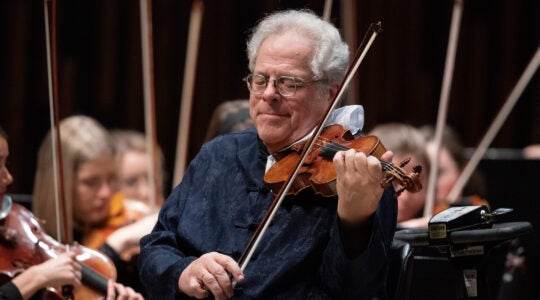Matt Seinuk, a Jewish civil engineer who lives in the East Village, has been paying very close attention to the Democratic mayoral race.
He’s well aware that two divisive candidates, former Gov. Andrew Cuomo and State Assembly member Zohran Mamdani, are leading the polls ahead of Tuesday’s primary election. And yet, when Seinuk, 30, casts his ranked-choice ballot next week, he plans to vote for neither of the frontrunners.
“Policy-wise, Zohran and Cuomo are bad candidates, both in their respective directions,” Seinuk told the New York Jewish Week.
“I can’t morally justify voting for someone who has credible sexual harassment allegations against him from a dozen women,” Seinuk said, referring to Cuomo, who resigned as governor in 2021 over multiple sexual harassment allegations. “I couldn’t personally reconcile with voting for someone who I believe is an immoral individual.”
As for Mamdani, Seinuk’s reasons for not ranking him are “really in the opposite direction,” he said. “He has a very terrible record on any statements with regard to Jews and Israel.” (Just this week, Mamdani — who, if elected, would be the city’s first Muslim mayor — declined to condemn the phrase “Globalize the intifada.”)
Seinuk is hardly alone in his distaste for the leading candidates. Nor is he the only New York City Jew who is planning to leave both Cuomo and Mamdani off their ballot.
Voters “are really thinking about what is best and agonizing over what is the best thing to do, re: these two candidates — keep them on or leave them off?” Phylisa Wisdom, executive director of New York Jewish Agenda, a progressive advocacy group, said. “It’s a weird bag of people who are really agonizing in a way that I haven’t seen before.”
The calculation is complicated by ranked-choice voting. In an editorial Tuesday, the New York Times seemed to reluctantly advise that Cuomo “would be better for New York’s future than Mr. Mamdani.”
But the editorial also addresses those in the neither-Cuomo-nor-Mamdani camp. “For any voters tempted to leave both off their ballots, it is important to understand that this decision would be tantamount to expressing no preference between the two,” they write. “It is similar to voting for neither major-party candidate in a traditional election. If the polls are correct and the race is between Mr. Cuomo and Mr. Mamdani, the thing that matters most on a ballot will be the relative positions of those two candidates.”
A new Marist poll, conducted June 9-12 and published Wednesday, indicates that 38% of likely Democratic primary voters will rank Cuomo first, followed by 27% who prefer Mamdani.
New York Jewish Agenda’s Wisdom said that among those she speaks with on a daily basis — politically engaged and progressive Jewish New Yorkers — most people understand how ranked choice voting works: that if a voter’s candidate doesn’t make it to the final round between the last two candidates, the voter’s ballot is exhausted.
Yet some Jewish voters, even with that calculation in mind, will still not vote for either Cuomo or Mamdani.
Randi Hoffman, a 65-year-old longtime resident of Lower Manhattan, is one of them. She’ll be ranking New York City Comptroller Brad Lander first, New York City Council Speaker Adrienne Adams second, former Manhattan borough resident and former New York City Comptroller Scott Stringer third, New York State Sen. Zellnor Myrie fourth, and former Democratic National Committee vice chair Michael Blake fifth.
“I’m not really that fired up about anybody, but I think the people that I’m voting for would be competent leaders,” said Hoffman, who is Jewish and a professor at Hudson Community College in New Jersey.
Like Seinuk, Hoffman said she was turned off by the sexual allegations against Cuomo. As for Mamdani, she’s concerned about his views on Israel, among other things.
“Mamdani — I just can’t bring myself to vote for someone who doesn’t believe that Israel should be a Jewish state,” she said. (Asked on a local news station this month whether he believes Israel has a right to exist as a Jewish state, Mamdani replied, “I’m not comfortable supporting any state that has a hierarchy of citizenship on the basis of religion or anything else.”)
“And even though I know that the mayor doesn’t really do foreign policy, I also — just listening to him talk, I think he’s too young,” Hoffman said.
Five spots are on the ballot for New York City’s Democratic mayoral primary this year, the city’s second experiment with ranked-choice voting, which can be a confusing process.
In this primary election, voters can rank up to five candidates in order of preference. If no candidate earns more than 50% of the vote share in the first round of counting, tallying continues for the next round, and the candidate with the fewest votes is eliminated. Counting continues until one candidate earns more than 50% of the vote share, and could repeat up to 11 times.
And while many New Yorkers are debating ranking strategies among their friends and colleagues, Seinuk views his primary ballot as a reflection of his values more than a strategic choice. He plans to rank Lander and Zellnor Myrie in the first two spots — he’s not sure yet which will be no. 1 — and Adrienne Adams in the third spot. He plans to put former hedge fund manager Whitney Tilson in the fourth slot, and Michael Blake in fifth place. (For a Jewish guide to the candidates, click here.)
“I find it very disturbing that people I know who consider themselves moral, upstanding, religious folk think that it’s okay to [vote for Cuomo] because he’ll be better for Israel, or he’ll be better for the Jews only,” he said.
Renanit Levy, 52, knows the first choice she’ll be marking on her ballot will be Brad Lander. After that, she’s still deciding — though she won’t rank Cuomo or Mamdani.
“I realize that there are people who would think that I’m quote, unquote, ‘throwing my vote away,’” said Levy, an independent nonprofit consultant who lives in Brooklyn. “I don’t feel that way about it.”
She added: “There are different reasons why I do not feel comfortable with either of them representing me as mayor…. I couldn’t pick one of them, so I don’t want either of them on my ballot. So I am voting my values — or I’m really voting against both of them.”
Should Mamdani or Cuomo win the primary and appear on the Democratic ticket come November, Seinuk said that he will likely vote for Mayor Eric Adams, who is running for reelection as an independent and hopes to run on two new ballot lines: “EndAntiSemitism” and “Safe&Affordable.”
(What the November ballot will look like remains to be seen: Cuomo announced in May his intention to run as an independent candidate, should he not clinch the Democratic nomination, while the Working Families Party has said it is prepared to run a candidate in November on their own ballot line if Cuomo wins the Democratic nomination.)
“I don’t particularly like Adams, either, but I think he’s done some good things, and he’s done a whole lot of bad things,” Seinuk said, referring to the federal corruption charges faced by the mayor last fall, which were dismissed by the Trump administration in the spring. “And in an argument of lesser evils, I would say getting some free airline upgrades is significantly less evil than sexual harassment by many margins.”
For Hoffman, it’s all about perspective. “I just, at this point, feel like I want to be idealistic enough to choose who I really like best and not be so strategic, because they’re all Democrats,” she said. “None of them are as horrific as Trump and his cronies.”
The New York Jewish Week brings you the stories behind the headlines, keeping you connected to Jewish life in New York. Help sustain the reporting you trust by donating today.





